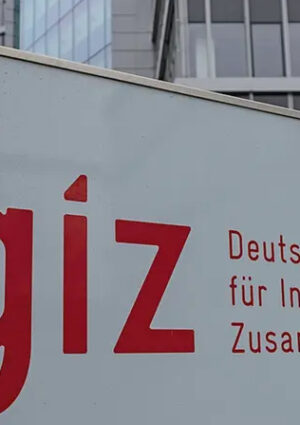The impacts of satellite Earth Observation (EO) for sustainable development are well documented, but the wider benefit of EO to developing countries is less understood. To address this gap, the European Space Agency (ESA) Global Development Assistance (GDA) programme initiated a study under its Monitoring & Evaluation and Impact Assessment activity, with a particular focus on EO’s contribution to ‘digital spillovers’.
The report is available here.
Developing countries have a small but growing contribution to the global EO industry
Satellite Earth Observation (EO) is the gathering of information about the physical, chemical, and biological systems of the planet via remote-sensing technologies. The development and exploitation of EO – from manufacturing to creating products and services that use EO data – has been concentrated in developed economies such as the US, Europe, and Japan. Conversely, developing regions have a smaller share of the EO industry. A London Economics analysis highlights 241 EO companies were operating in developing countries in 2019, contributing €82 million to the global EO market (equivalent to 2.2%), and supporting 1,250 employees. However, the developing world does represent stronger growth, with a 14% compound annual growth rate (CAGR) between 2012 and 2019, compared to 9% globally.
This lower involvement from developing countries is explained by the high capital cost of upstream activities (satellite design, build, launch, and operation) and the required investments in digital capabilities, such as human and physical capital, software, and internet connectivity, required for downstream activities (analysis of EO data to address an end user’s challenge). The significant fixed costs of data collection create entry barriers – with the result being high prices for EO data and under-exploitation of EO by suppliers and users in downstream activities.
Growth in the EO industries of developing countries would allow organisations in those countries to develop EO products that are highly tailored to local needs by capitalising on an acute cultural and contextual understanding of the specific local problem e.g., monitoring smallholder farms, improving crisis preparedness, mapping poverty, and mapping tropical rainforest. In addition, the growth of developing world EO industries would promote business and skilled job creation.
ESA’s GDA programme strives to support the adoption and mainstreaming of EO by cooperating with International Financial Institutions (IFIs) such as the World Bank (WB) and Asian Development Bank (ADB) to implement skills transfer activities so that developing countries can use, produce, and deliver diverse EO products and support local users in uptake.
Investment in EO boosts data-driven decision-making in developing countries
The value of EO data is derived from the fact that it can be used to improve a data-driven decision-making process. EO data has several strengths relative to aerial, in-situ or manual methods of data collection including affordability, coverage, speed, continuity, impartiality, and anonymity.
ESA has been working with IFIs to exploit these unique strengths in the context of sustainable development and to mainstream EO in IFI operations including for urban planning, disaster resilience, water resources management, blue economy, fragility, forestry, and other thematic domains. These benefits are documented in Caribou Space’s report on Adoption and Impact of Earth Observation for the 2030 Agenda for Sustainable Development.
As there is already literature regarding the uses and impacts of EO in sustainable development, the objective of this article is to document the wider benefit of EO capabilities to other areas of the economy such as ‘digital spillovers’.
Investment in the digital capabilities required to exploit EO data also greatly benefits other parts of the economy
Growth of developing world EO industries benefits other parts of the economy via business and skilled job creation.
The investment in digital capabilities, such as human skills and IT infrastructure, allows the diffusion of human, physical, and intangible assets, both within the EO sector, and from the EO sector to other sectors. These ‘digital spillovers’ have been shown to accelerate knowledge transfer, productivity, and innovation within a company, between competitors, across supply chains, and even across industries.
For every US$1 invested in digital capabilities, such as EO, society gains US$20 in wider economic benefits – which is seven times greater than investments in non-digital assets such as roads. EO is highlighted as an increasingly relevant digital technology for development, which suggests a high potential return from investments in EO capabilities. These benefits occur to society as a whole and exceed the benefits that would be captured by private companies making the EO investments. Therefore, there is likely to be underinvestment in EO relative to the level that is most beneficial for society.
Due to this issue, there is a role for the development community including IFIs and National Development Agencies (NDA), to support the growth of nascent EO industries in the developing world and increase levels of investment in digital capabilities generally. IFIs can communicate these positive impacts from EO to add value to their continuous policy dialogue with client countries and NDAs, i.e., that there are both direct benefits of EO for sustainable development to users, and benefits to the wider economy of developing countries because of spillover effects.
GDA will accelerate impact by fully capitalising on the power of EO in international development assistance operations
GDA is powered by ESA with a focus on technical solutions and implemented in partnership with the WB and the ADB. These partners have complementary finance of $70 million aligned to associated capacity building and skills transfer activities which will consequently support the growth of developing world EO industries. An example of the type of skills transfer activity that an IFI would implement is the WB Resilience Academy which “transfers digital tools and practical risk management skills to benefit the next generation.”
However, despite the benefits of EO, there are several associated challenges that ESA, IFIs and policymakers in developing countries should be aware of. These include data sovereignty concerns; the need for governments to make significant investments in digital capabilities; and the potential negative impact of digitalisation on employment.
To address some of those challenges, the GDA programme has been collaborating closely with different teams within IFIs. At the WB, this includes the Digital Earth Partnership, that has been established to complement GDA, with the aim of ensuring ethical and sustainable adoption of EO, and at the ADB the EO for Development and Digital Transformation initiative.
This study has begun to address the major literature gap regarding the benefits of spillovers from EO to the wider economy. However, this is only the first step, and this gap remains open. To further shine a light on this topic it would be beneficial for the IFIs to build on this and advance the discussion further from their respective perspectives.
As this article has highlighted – an under-appreciated aspect of the benefit of EO in developing countries is the growth of their wider economies via spillover effects. With a more detailed understanding of both the positive economic spillovers and the potential risks, ESA, IFIs and developing country policymakers can ensure further advancement towards achieving GDA’s mission – to accelerate impact by fully capitalising on the power of satellite EO in international development assistance operations.
The report is available here. Please contact gda@esa.int with any questions.








![[VIDEO] ‘Wider Economic Benefits from Satellite EO in Developing Countries’](https://gda.esa.int/wp-content/uploads/2023/06/wider-card-340x250.jpg)




